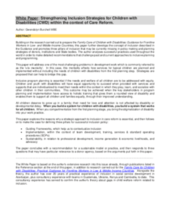Abstract
Building on the research carried out to prepare the Family Care for Children with Disabilities: Practical Guidance for Frontline Workers in Low- and Middle-Income Countries, this paper further develops the concept of inclusion described in the Guidance and promotes three pillars of inclusion that may be currently missing in policy making and planning strategies of donors, institutions and State bodies. The author analyses successful practices used throughout the world in order to make detailed recommendations that challenge past and current approaches to inclusive planning and programming.
This paper will address one of the most challenging problems in development work which is commonly referred to as the ‘silo mentality’. In this case, this mentality affects how services for typical children are planned and implemented without including the needs of children with disabilities from the first planning step. Strategies are proposed that can help to bridge this gap.
Inclusive program planning is essential if the needs and welfare of all children are to be addressed with equity. Children and youths with disabilities will have equal opportunity to succeed when provided with services and supports that are individualized to meet their needs within the context in which they play, learn, and socialize with other children in their communities. This outcome may be achieved when the key stakeholders in program planning and implementation have access to holistic training that gives them a rounded view of disability and enables them to support all children and families equally, through their improved understanding.
All children deserve to grow up in a family; their need for love and attention is not affected by disability or developmental delay. When you build a system for children with disabilities, you build a system that works for all children. When you compartmentalize from the first planning stage, you bring the stigmatization of disability into your work practice.
This paper explores the reasons why a strategic approach to inclusion in care reform is essential, and then follows on to make the case for defining three pillars for successful inclusion policy:
- Guiding Frameworks, which help us to contextualize inclusion
- Implementation, within the context of team development, training, services & standard operating procedures (SOPs)
- Sustainability, in relation to professional development, income generation & economic livelihoods, and advocacy
The paper concludes with a recommendation for a sustainable model or practice, and then responds to three questions that may have particular relevance to a donor agency, based on the arguments put forth in this paper.

